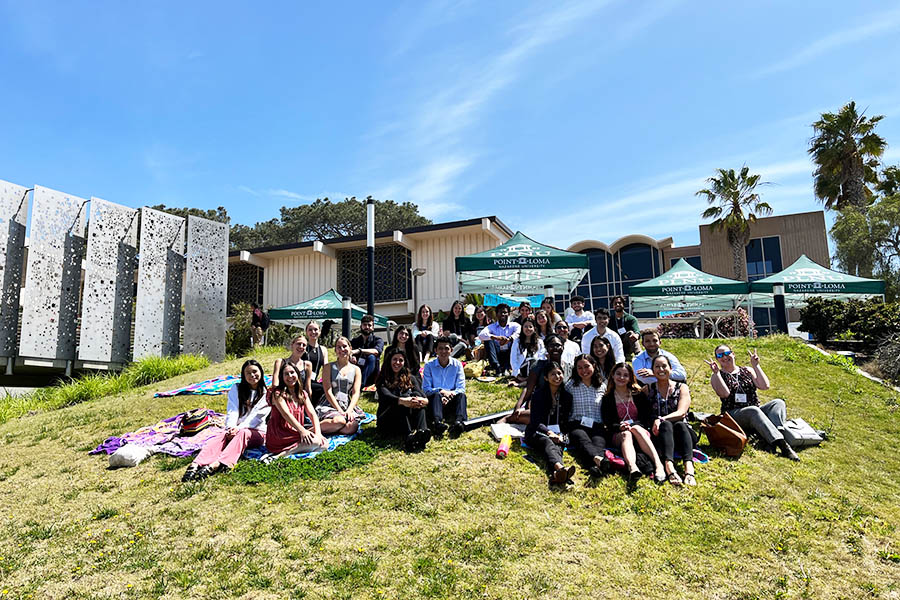
Five students from Loyola Marymount University earned awards at the 45th annual West Coast Biological Sciences Undergraduate Research Conference (WCBSURC), held in San Diego April 9. As the nation’s oldest continuously operating intercollegiate conference of its kind, the WCBSURC provides a forum for undergraduate researchers to present original data in the fields of biology and biochemistry, while fostering intercollegiate interactions among students and faculty who share a commitment to undergraduate research in the biological sciences. The 2022 LMU winners:
Kamilah Roca-Datzer ’22
Major: Biology
Award: First Place, Oral Presentation in Biochemistry for “Aim32 Is a Dual-Localized 2Fe-2S Mitochondrial Protein That Functions in Redox Quality Control”
Mentor: Deepa Dabir, Ph.D.
As part of Dabir’s molecular biology research lab, Roca-Datzer works toward characterizing the function of the mitochondrial protein Aim32, which was discovered in the lab several years ago. Last summer, Roca-Datzer led an experiment that confirmed that Aim32 is located in both compartments of the mitochondria.
Roca-Datzer says she was “equally nervous and excited” for her first in-person conference. “It was awesome going to the conference with so many of my fellow biology peers and friends,” she says. “Luckily, my seminar went very well. Many of my peers attended my session to show their support, which calmed my nerves. At the end, Dr. Dabir and my lab partners congratulated me on my talk, which made rehearsing for it for so long worth it.”
Caroline Manibo ’22
Major: Biology
Award: Best Talk in Aquatic and Marine Biology for “Species Range Assessment of Mytilus Congeners Along the U.S. Pacific Coast”
Mentor: Christina Vasquez, Ph.D.
Manibo’s seminar focused on the impact of climate change on the range assessment of two species of mussels along the Pacific Coast. “I learned in different classes that climate change can dramatically affect organisms in all levels of a food chain, and many do not realize that stressors such as the rise in temperatures or changes in salinity can affect even the smallest of organisms, like mussels,” Manibo says. “These changes can ultimately influence invasive species to dominate in areas and outcompete native species, which can lead to extinction.”
WCBSURC was Manibo’s first in-person conference, and one she won’t soon forget. “It was an amazing experience being able to show others my project,” she says, “but also to have discussions with different students and professors about their work.”
Brian Wells ’22
Major: Biology
Award: Best Poster for “The Impact of Over-Activating Serotonin Receptor 2C in Developing Embryos”
Mentor: Max Ezin, Ph.D.
Wells’ poster examined the effects of psilocybin, the hallucinogenic compound in magic mushrooms, on embryonic development. Psilocybin treatments are currently being used in clinical trials for cases of anxiety that have not responded to other anti-anxiety treatments. “As of now, there is no guidance regarding potential dangers for pregnant mothers receiving this treatment; we aim to fill this gap in research,” Wells explains. “Our preliminary results suggest that there is a possibility of embryonic defects as a result of psilocybin exposure.”
Of the conference experience, Wells says, “It was an absolute blast being able to share the research that we’ve been pouring ourselves into with other like-minded students, and to see all the exciting research being done by universities from across the country.”
Christina Noravian ’23
Major: Biology
Award: Best Talk in Cell Biology for “Stages of Trachemys Scripta Turtle Embryo Development”
Mentor: Max Ezin, Ph.D.
The project on which Noravian presented involves creating a staging series — a standardized method of documenting an animal’s development before experimental work can begin — for the Trachemys scripta turtle. That has meant documenting and depicting the turtle’s embryonic development from some of the earliest days post-fertilization, all the way to its hatching out of the egg.
“It was exciting to see all the work happening in biology being done by undergrads,” Noravian says. “I loved sharing the experience with all the other biology students at LMU too, because it was nice to feel their support and also be there to watch and support them. Being able to present was a great moment — all those hours in the lab definitely pay off when you see others excited and intrigued by your work.”
Audrey Covington ’24
Major: Biochemistry
Award: Best Poster for “Examining the Temperature-Dependence of HTLV-1 Pro-Pol Programmed -1 Ribosomal Frameshifting”
Mentor: Katie Mouzakis, Ph.D.
Covington’s poster focused on a mechanism in the human T-cell leukemia virus type 1 (HTLV-1) viral life cycle that can lead to enhanced infection. “I have always been fascinated by biochemical pathways, so as someone interested in a healthcare career, I immediately wanted to find out more when I heard about this topic in the context of an infamous human disease,” she says.
Although she had previously delivered a virtual poster presentation at the 2021 Southern California Conference for Undergraduate Research, this was Covington’s first in-person conference. “I was looking forward to experiencing the atmosphere of a live conference,” she says. “It was eye-opening to learn about what student researchers at other universities are working on, especially those who are investigating a similar topic of study.”



